Introduction
This presidential election is in many ways a culmination of several long-standing foreign policy battles, including on immigration at the U.S.-Mexico border, climate change, and the Israel-Palestine conflict. It is of little surprise that at each debate, the candidates have grappled with these complex issues, hoping that their respective policies will resonate with segments of the American electorate. A Carnegie-sponsored survey conducted in late August 2024 took a deep dive into how registered American voters believe the United States should address these critical foreign policy challenges. Here are some key findings:
- On immigration, a slim majority of Americans agreed that undocumented immigrants should be allowed to remain in the country if certain conditions are met, though specific criteria were not assessed in the survey. Among supporters of former president Donald Trump, Hispanic Americans were least supportive (37 percent) of measures aimed at removing undocumented immigrants compared to Black Trump supporters (51 percent) and White Trump supporters (77 percent).
- While a plurality of Americans (43 percent) strongly supported U.S. involvement in international efforts to reduce carbon emissions, few supported completely phasing out fossil fuels in favor of renewable energy sources—with the exception of White voters who support Vice President Kamala Harris (51 percent).
- A plurality of Americans (44 percent) supported the United States pushing Israel toward a ceasefire and hostage exchange in the Israel-Hamas conflict. However, the partisan divide was more pronounced among White voters than Black; White Harris supporters favored a ceasefire at 74 percent compared to White Trump supporters at 21 percent, while Black Harris supporters favored a ceasefire at 53 percent compared to Black Trump supporters at 41 percent.
The full results of the survey, conducted by the Carnegie Endowment’s American Statecraft Program in conjunction with YouGov, are available here.
Hispanic Trump Supporters Are Not Supportive of Deporting Undocumented Immigrants
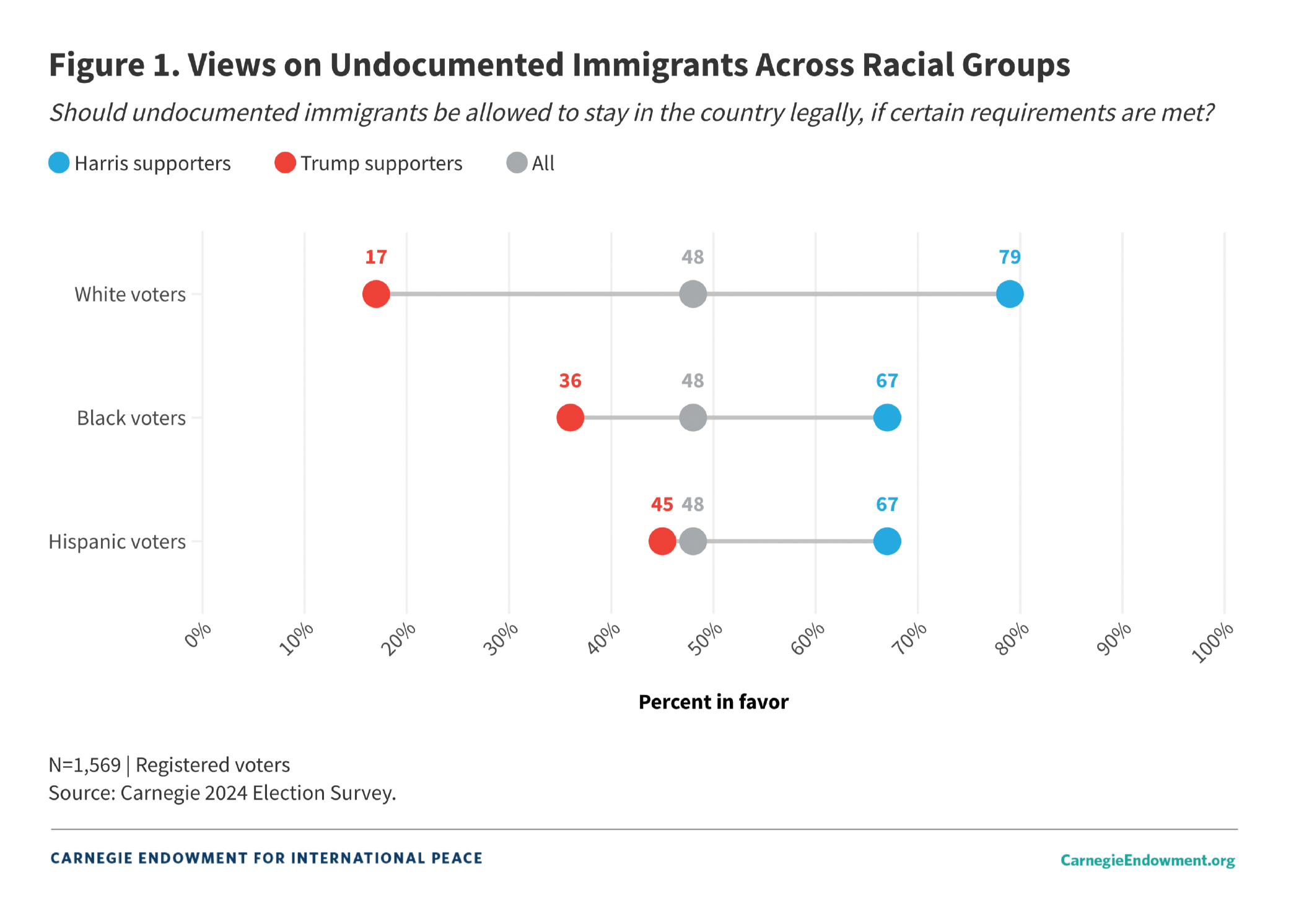
Both Harris and Trump have introduced immigration policies aimed at addressing the American people’s concerns with the U.S.-Mexico border. Trump, for his part, has pledged the most extensive deportation program in U.S. history, alongside plans to restrict legal immigration. Harris has acknowledged the need for stronger border security while also advocating for an overhaul of the immigration system to expand pathways for legal immigration. To better understand public opinion, Carnegie’s survey asked respondents about their views on undocumented immigrants and legal immigration pathways.
Forty-eight percent of all surveyed voters supported allowing undocumented immigrants to stay in the nation if they met certain requirements, while 43 percent opposed this. Although Hispanic and White voters both ranked immigration at the southern border as their top foreign policy concern, their views on the status of undocumented immigrants differed. A majority of Hispanic Americans (57 percent) and Black Americans (57 percent) favored allowing undocumented immigrants to remain in the country legally, whereas only 46 percent of White Americans supported this approach.
For those backing Harris, 79 percent of White, 67 percent of Black, and 67 percent of Hispanic voters supported such measures, while only 16 percent of White, 22 percent of Black, and 26 percent of Hispanic respondents opposed them, indicating a relative consensus among Harris supporters on this issue.
However, an opposing consensus does not seem to exist among Trump supporters. Among White Trump supporters, 77 percent believed that undocumented immigrants should not be allowed to stay in the country legally. In contrast, a slim majority of Black Trump supporters (51 percent) and even fewer Hispanic Trump supporters (37 percent) favored this policy. The relatively low support among Hispanic Trump supporters for removal of undocumented immigrants is noteworthy, signaling that not all segments of Trump’s base fully embrace his strong rhetoric on mass deportations.
This finding is particularly significant given that a similar poll found that 36 percent of Hispanic voters support Trump, reflecting a slight increase from his 2020 performance. Hispanic voters constitute a critical segment of the electorate, especially in key swing states. Despite research indicating that many Hispanic voters are relatively liberal on immigration issues, 37 percent still reported planning to vote for Trump, despite his plans for mass deportations.1
Interestingly, while Hispanic Trump supporters were more likely than their White counterparts to favor allowing undocumented immigrants to remain in the United States and to oppose deportation, among Harris supporters it was White voters who were more likely to take these positions than their Hispanic counterparts. White Harris supporters and White Trump supporters were more divided from one another on immigration than Black or Hispanic voters.
Racial Minorities See Climate Change as Important but Are Hesitant About Energy Transition
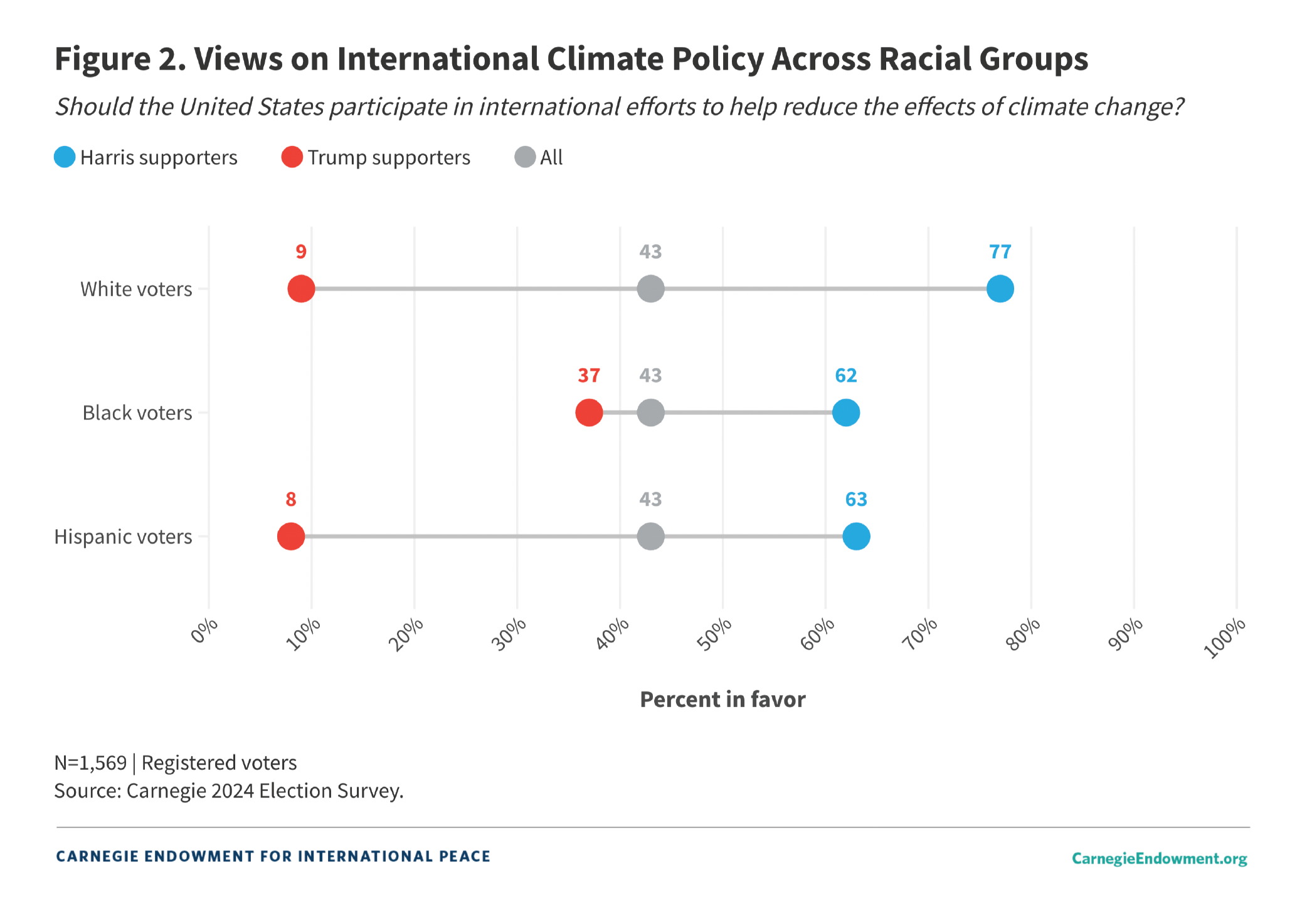
On climate change, which ranked as the second-most important foreign policy issue among all respondents, 72 percent of Americans surveyed expressed some degree of support for U.S. participation in international efforts to mitigate global climate change. Notably, a plurality of respondents (43 percent) strongly supported such actions, while an additional 29 percent somewhat supported these measures. Half (51 percent) of Black Americans strongly supported the United States playing an active role in international climate agreements, compared to 41 percent of White and 36 percent of Hispanic respondents. This finding, demonstrated in previous research, aligns with the fact that climate change ranked as the most important foreign policy issue among Black voters.
As expected in our highly polarized society, partisan affiliation plays a critical role in shaping views on climate change. Among Harris supporters, White respondents were the most supportive of U.S. participation in international efforts to reduce global climate change (77 percent), followed by 62 percent of Black and 63 percent of Hispanic respondents. Given the general disposition of the American right wing toward climate change, it’s not surprising that most Trump supporters opposed U.S. involvement in international climate agreements. However, interestingly, the partisan divide on international climate change engagement was narrowest among Black Americans and widest among White Americans. For instance, more than one-third (37 percent) of Black Trump supporters strongly backed U.S. participation in these efforts compared to only 9 percent of White Trump supporters and 8 percent of Hispanic Trump supporters.
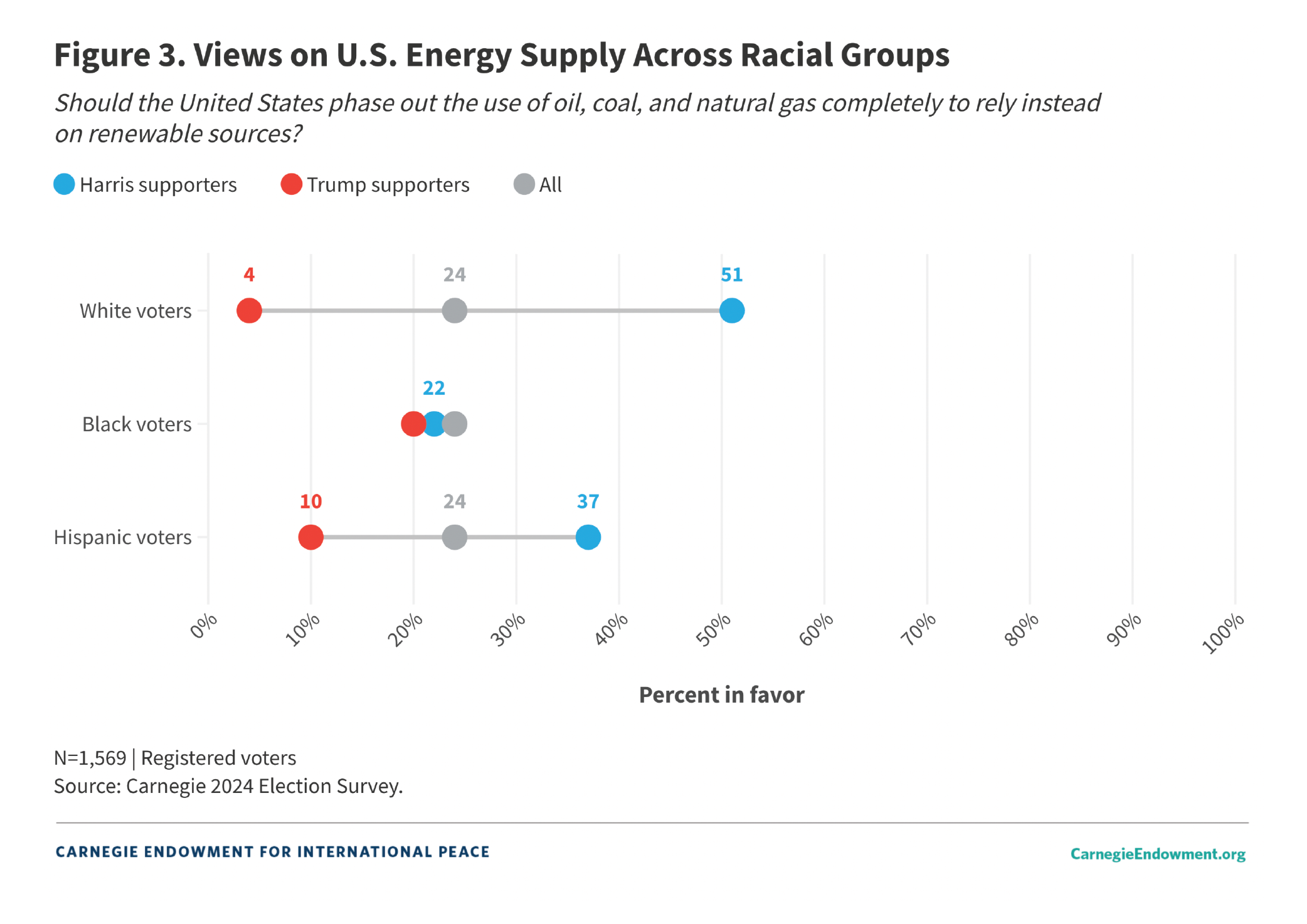
With the energy transition playing a critical role in the country’s strategy to limit carbon emissions and mitigate the effects of climate change, we asked respondents about their views on transitioning the U.S. energy supply to renewable sources. Topline findings revealed that half of respondents (52 percent) preferred that the United States use a mix of energy sources, and only a quarter (24 percent) agreed with phasing out the use of oil, coal, and natural gas to rely completely on renewable energy sources. A plurality of Black (41 percent) and Hispanic (41 percent) respondents, and a majority of White (55 percent) respondents, favored using a mix of energy sources rather than phasing out fossil fuels.
However, despite pronounced concerns about climate change and its deleterious effects among Black Americans more generally, a plurality of Black Harris supporters (43 percent) preferred that the United States use a mix of energy sources, compared to 22 percent who favored completely phasing out the use of oil, coal, and natural gas in favor of renewable energy. The same held true for Black Trump supporters, 38 percent of whom favored using a mix of energy sources, while only 20 percent favored phasing out fossil fuels for renewable sources.
As on immigration, the partisan divide on energy was most stark among White Americans. Even compared to Black Harris supporters, White Harris supporters were most in favor (51 percent) of phasing out the use of fossil fuels and replacing them with renewable energy sources, while a smaller chunk (38 percent) supported a mixed-energy approach. On the other hand, a mere 4 percent of White Trump supporters supported completely phasing out fossil fuels, and a vast majority (69 percent) supported using a mix of fossil fuels and renewable energy sources.
This finding is notable because, although our previous research indicated that there is heightened concern among Black Americans on both sides of the aisle about the need to act on climate change, there appears to be less confidence regarding the complete elimination of dependence on fossil fuels to combat climate change. This underscores the need for policymakers and candidates to develop effective messaging that is sensitive to communities’ concerns about energy transition.
The Partisan Divide on Ceasefire Support Is Sharpest Among White Americans
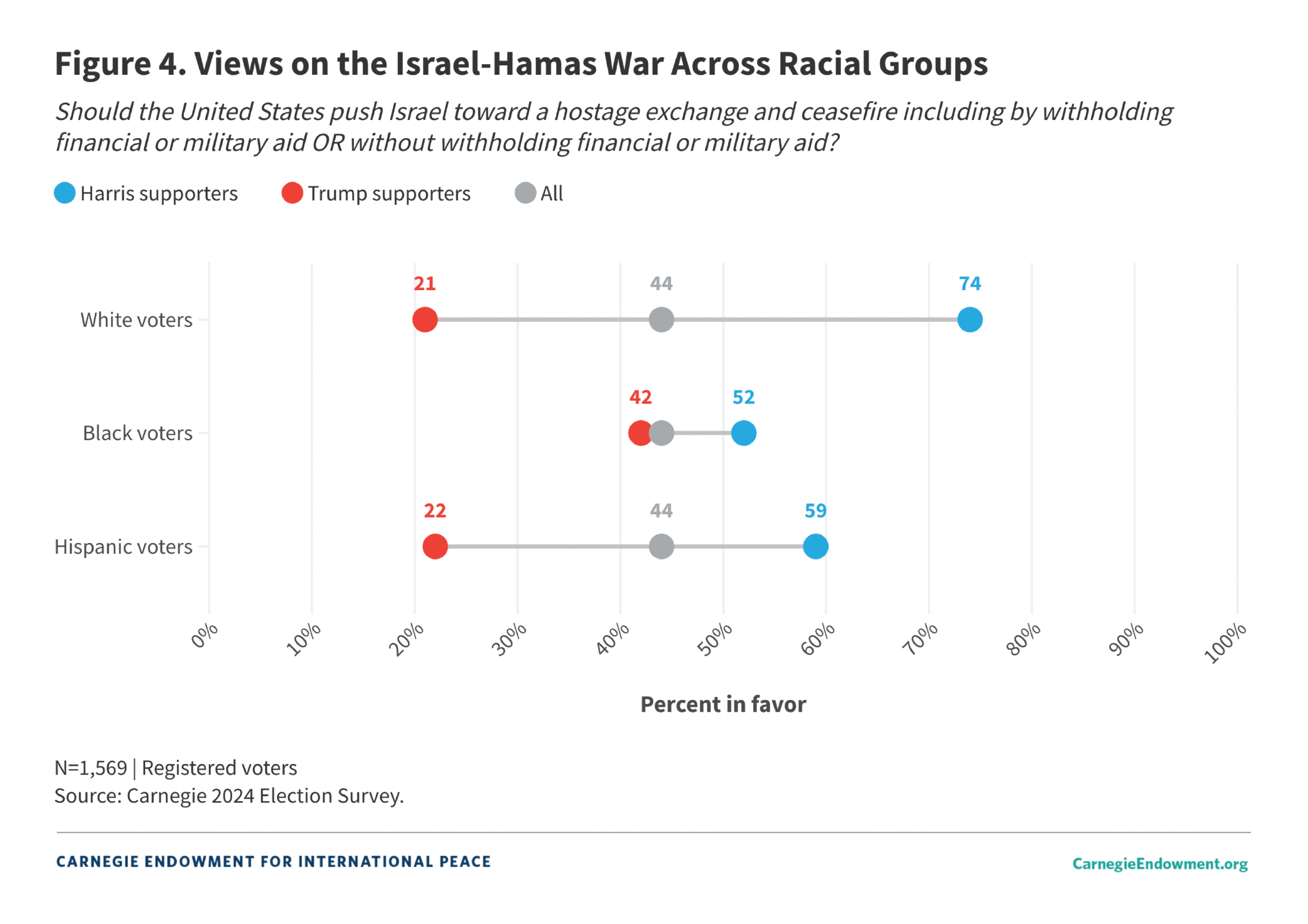
Regarding Israel’s war in Gaza—an issue that about one-third of voters indicated was highly important in their choice of presidential candidate—a plurality of Americans (44 percent) believed the United States should push Israel toward a hostage exchange and ceasefire. Among this group, 27 percent supported such actions even if they would require withholding financial or military aid from Israel, while 17 percent preferred that aid not be withheld. On the other hand, 25 percent of respondents said the United States should support any step Israel deems necessary to end the conflict, and a minority of respondents (16 percent) felt the United States should not be involved in the conflict at all.
The findings revealed a significant consensus among Black and White Americans in support for the United States pushing Israel toward a ceasefire in the conflict. In fact, 46 percent of Black Americans and 44 percent of White Americans expressed this preference, compared to 34 percent of Hispanic Americans. However, there was a notable divergence when it came to unconditional support for Israeli policy. Only 11 percent of Black Americans endorsed this stance, compared to 26 percent of White Americans and 20 percent of Hispanic Americans. This finding is not surprising, considering that in the months following Hamas’s attack on Israel of October 7, 2023, African American faith leaders and civil society organizations were among some of the most outspoken voices critiquing the administration of President Joe Biden and Kamala Harris on its Middle East policy.
While the partisan divide on the Israel-Hamas conflict is stark among White Americans, the same is not necessarily true of Black Americans. For instance, more than half (52 percent) of Black Harris supporters wanted to see the United States push Israel toward a ceasefire and hostage exchange, with 33 percent supporting the withholding of military support and 19 percent supporting a ceasefire without withholding such aid. In comparison, 74 percent of White Harris supporters shared the desire to see the United States advocate for ceasefire, with 52 percent supporting the withholding of military aid and 22 percent supporting a ceasefire without withholding aid. Conversely, only 21 percent of White Trump supporters agreed that the United States should push Israel toward a hostage exchange and ceasefire, whereas twice that number of Black Trump supporters (42 percent) held that view, indicating relative ideological homogeneity among Black Americans on this issue compared to White Americans.
It is apparent that on this issue once again Black Americans are less polarized than White Americans. There may be different reasons for Black Americans on either side of the aisle to support a ceasefire, such as a desire to defend human rights or a desire to see the United States less involved in overseas wars, but the result is that there is more consensus among Black voters on this issue.
Black and White Harris Supporters Split on Ukraine Policy
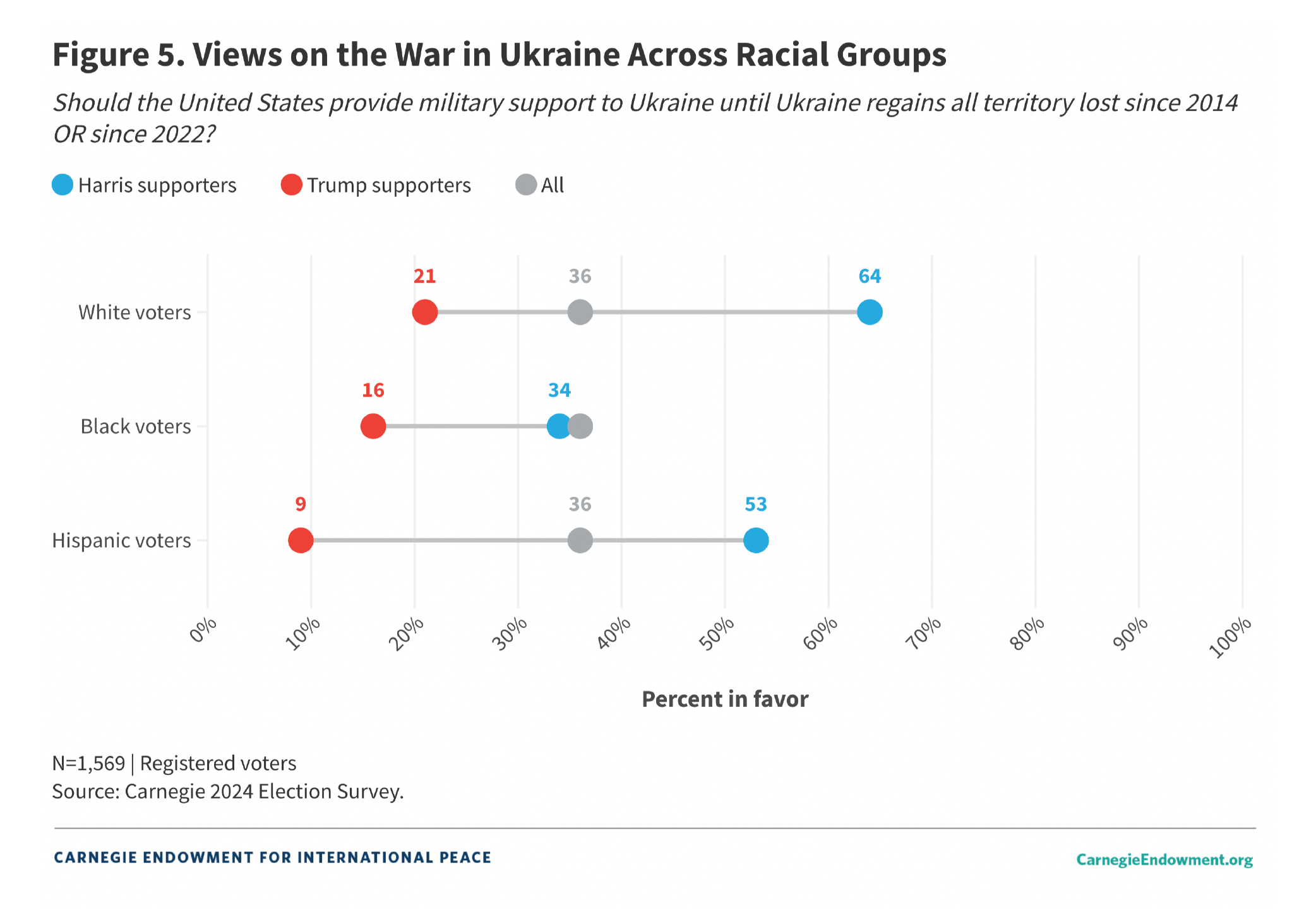
Both presidential candidates are grappling with the costly war between Russia and Ukraine. Trump, without specificity, has declared that he would end the war as soon as quickly as possible, while Harris has affirmed her support for Ukraine, dismissing any proposals that would compel the Ukrainian government to cede territory. In light of these differing stances, we asked respondents about the goals they wanted to see the United States adopt in this conflict.
A plurality of Americans (36 percent) favored the United States’ continued support of Ukraine until Ukraine recovers its lost territory from Russia. This group includes the 19 percent of respondents who believed the United States should support Ukraine until it regains all territory lost since 2014 and the 17 percent who believed the United States should support Ukraine until it regains the land lost since Russia’s February 2022 invasion. Conversely, 31 percent of Americans preferred that a negotiated settlement be reached even if that would mean Ukraine must cede some of its territory. This group includes the 17 percent who favored the United States maintaining military support until such a deal is reached and the 14 percent who believed aid should be reduced until a ceasefire is negotiated. Meanwhile, around one in five Americans (21 percent) believed the United States should not be involved in the conflict at all.
Equal shares of Black, White, and Hispanic respondents supported a peace settlement between Ukraine and Russia that would freeze the war at the current frontlines. Specifically, 30 percent of White, 33 percent of Black, and 31 percent of Hispanic voters supported this approach. Additionally, roughly the same number of individuals in each racial group believed the United States should not be involved in the conflict at all, with 21 percent of White, 21 percent of Black, and 24 percent of Hispanic respondents expressing this view. The largest observable difference in opinion across racial lines emerged in support for the continuation of the war in Ukraine. While 38 percent of White respondents supported providing military aid to help Ukraine regain its territorial integrity, only 27 percent of Black respondents and 29 percent of Hispanic respondents shared this view. This finding is in line with similar polling that has found that Black Americans exhibit less support for continuing the war in Ukraine than other racial groups, particularly White Americans.
Among Trump supporters, regardless of race, there is limited appetite for the continuation of the war in Ukraine and sizable support for negotiating a peace deal. Thirty-seven percent of White Trump supporters favored freezing the conflict. Similarly, 45 percent of Black Trump supporters preferred freezing the frontlines, and the same held true for Hispanic Trump supporters, with 42 percent seeking to freeze the conflict. In contrast, a mere 16 percent of Black, 21 percent of White, and 9 percent of Hispanic Trump supporters backed a continuation of the war in Ukraine.
On the other hand, there was a significant split in opinion among Harris supporters regarding the continuation of the war. White Harris supporters exhibited the strongest support for the continuation of the war in Ukraine, with 64 percent of White Harris supporters favoring military aid to restore Ukraine’s territorial integrity, compared to 53 percent of Hispanic Harris supporters and 34 percent of Black Harris supporters. Black Harris supporters were most in favor of working toward a peace deal to freeze the conflict (32 percent), compared to 23 percent of White and 28 percent of Hispanic Harris supporters.
This aligns with previous research suggesting that while the Democratic Party has shifted into a more hawkish stance toward Russia following the February 2022 invasion, Black Americans have not fully subscribed to this shift in the party’s foreign policy approach. This reoccurring finding regarding racial differences in support for military intervention is crucial for policymakers as they craft messaging for the Black community during a time when pundits are concerned about waning voter enthusiasm and potential party realignment.
Black Americans Largely Favor a Cooperative Relationship with China
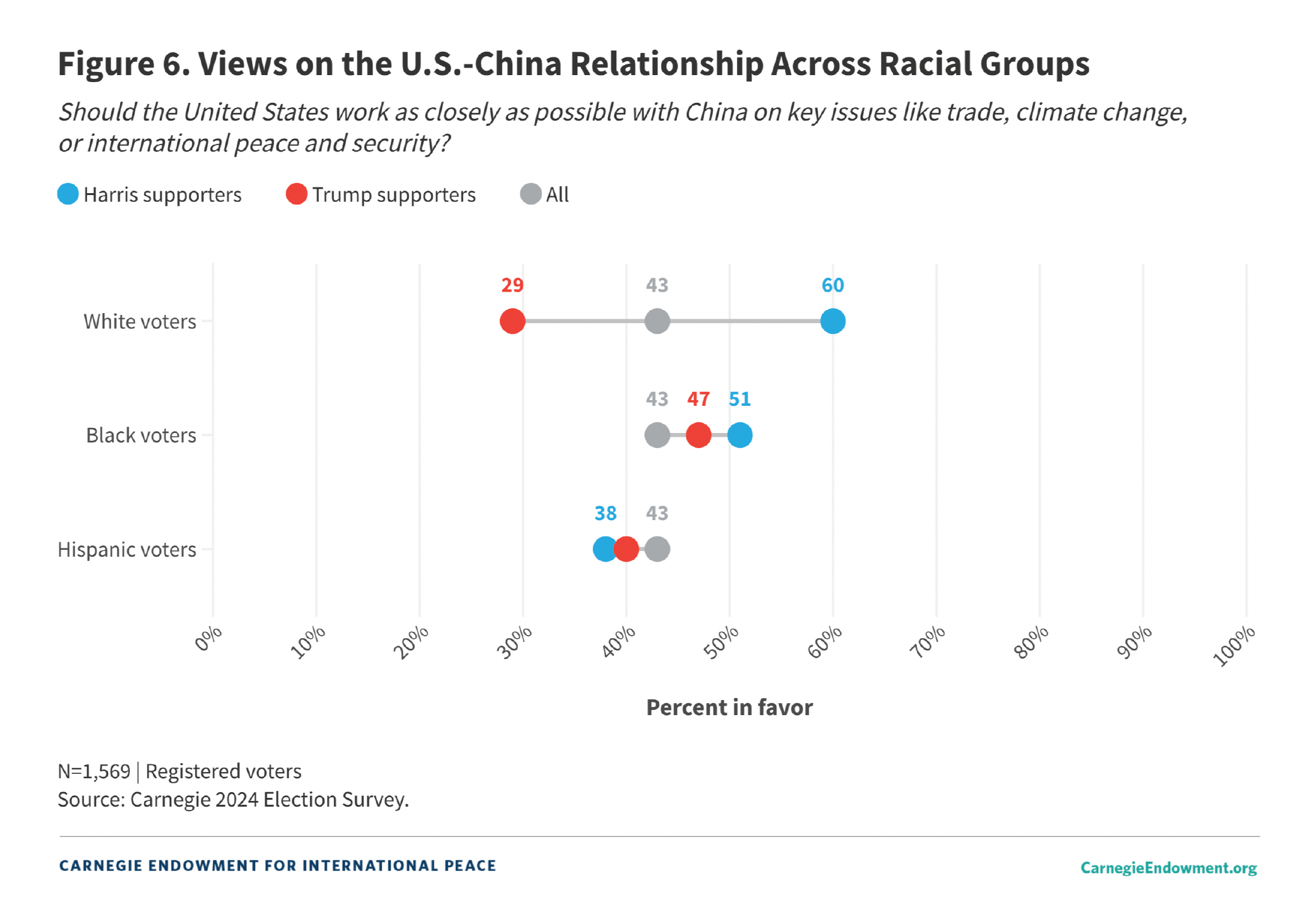
Amid ongoing discussions about China’s global rise, we asked respondents which approach they believed the United States should take in its relationship with China. Our poll revealed that Americans were slightly more inclined to favor (43 percent) close cooperation with China on shared challenges, such as climate change, international peace and security, and trade, than to prefer the United States strengthens its efforts to limit China’s power and influence globally (40 percent). Similar polling has found that large shares of the public see China as a competitor, but many would prefer the relationship be steered away from military conflict.
Interestingly, topline findings for racial groups revealed that Black Americans were least supportive of limiting China’s power at 24 percent in favor, compared to 41 percent of White and 41 percent of Hispanic respondents. In fact, Black Americans were most supportive of working closely with China on shared challenges at 47 percent, followed by 41 percent of Whites, with Hispanics being the least supportive at 36 percent.
There was relative consensus among Harris supporters about prioritizing cooperation with China over efforts to curb China’s rise and maintain a United States–led world order. Sixty percent of White Harris supporters, 51 percent of Black Harris supporters, and 38 percent of Hispanic Harris supporters supported working closely with China. In contrast, 24 percent of White Harris supporters, 22 percent of Black Harris supporters, and 43 percent of Hispanic Harris supporters preferred limiting China’s global influence and power. On the other side of the aisle, a tough approach to China and its global influence was not a popular stance among all Trump supporters. For instance, 47 percent of Black Trump supporters preferred cooperation with China compared to 29 percent of White Trump supporters and 40 percent of Hispanic Trump supporters. These findings indicate that, regardless of political affiliation, many in the Black community tend to prefer diplomacy and restraint with China to strategies that could lead to increased military conflict.
Conclusion
The landscape of American policy preferences and partisan affiliation is complex and nuanced. While one might expect differences in foreign policy attitudes to appear strictly along party affiliation lines, our survey revealed that there is not always full alignment among party constituencies along racial lines. For instance, Hispanic Trump supporters were not in favor of deporting undocumented immigrants, and Black Harris supporters were not overwhelmingly supportive of an “as long as it takes” approach to Ukraine.
Furthermore, with the extreme polarization of our politics—whereby many Americans have shifted to the progressive left or the conservative right—the partisan divide is most apparent among White Americans. This suggests the possibility that White Americans (who make up a vast numerical majority of the country) have different foreign policy priorities from Black and Hispanic Americans.
This difference in foreign policy priorities may be shaped by the distinct historical experiences and sociopolitical realities of White ethnic groups compared to Black Americans. The relatively shared experience of racial discrimination and sociopolitical uplift may explain why Black voters, regardless of political affiliation, tend to lean toward moderation on issues such as the war in Gaza, the war in Ukraine, or cooperation with China. In contrast, the relative absence of that shared historical experience among White voters could explain why certain issues are or are not perceived as existential threats by some segments of White America, leading to more pronounced polarization. These subtle nuances in policy preferences are crucial to understand, as they are likely to persist into the next election cycle. A deeper understanding of these nuances will be invaluable for the candidates from both major parties as they seek to create effective messaging aimed at specific demographics.
Survey Design
The data analyzed here are based on a survey of 2,300 U.S. adults, designed by scholars at the Carnegie Endowment for International Peace and conducted by YouGov from August 27 to September 5, 2024. The overall results have a margin of error of plus or minus 2.3 percent, with higher margins of error for individual demographic subcategories. Given widespread speculation about diminishing enthusiasm among Black voters, particularly before Biden exited the race, YouGov oversampled Black Americans to ensure the study could draw meaningful inferences about segments of the Black community, particularly those supporting Harris or Trump.
1For data from our survey on attitudes toward legal immigration, click here for topline findings.
.jpg)